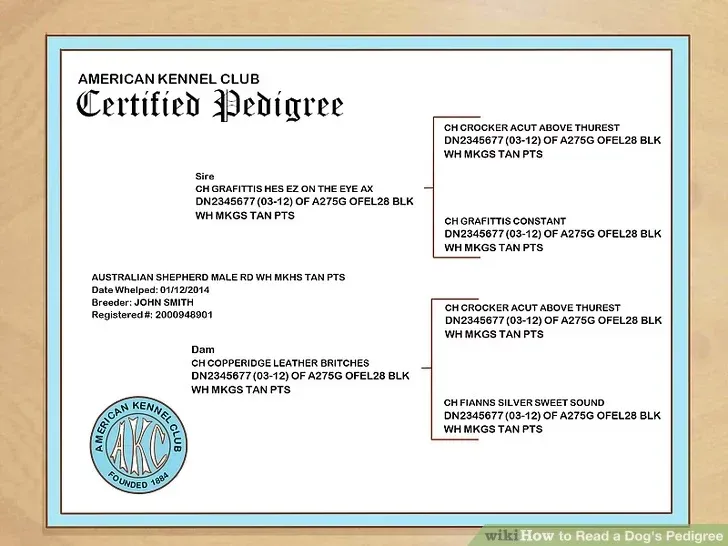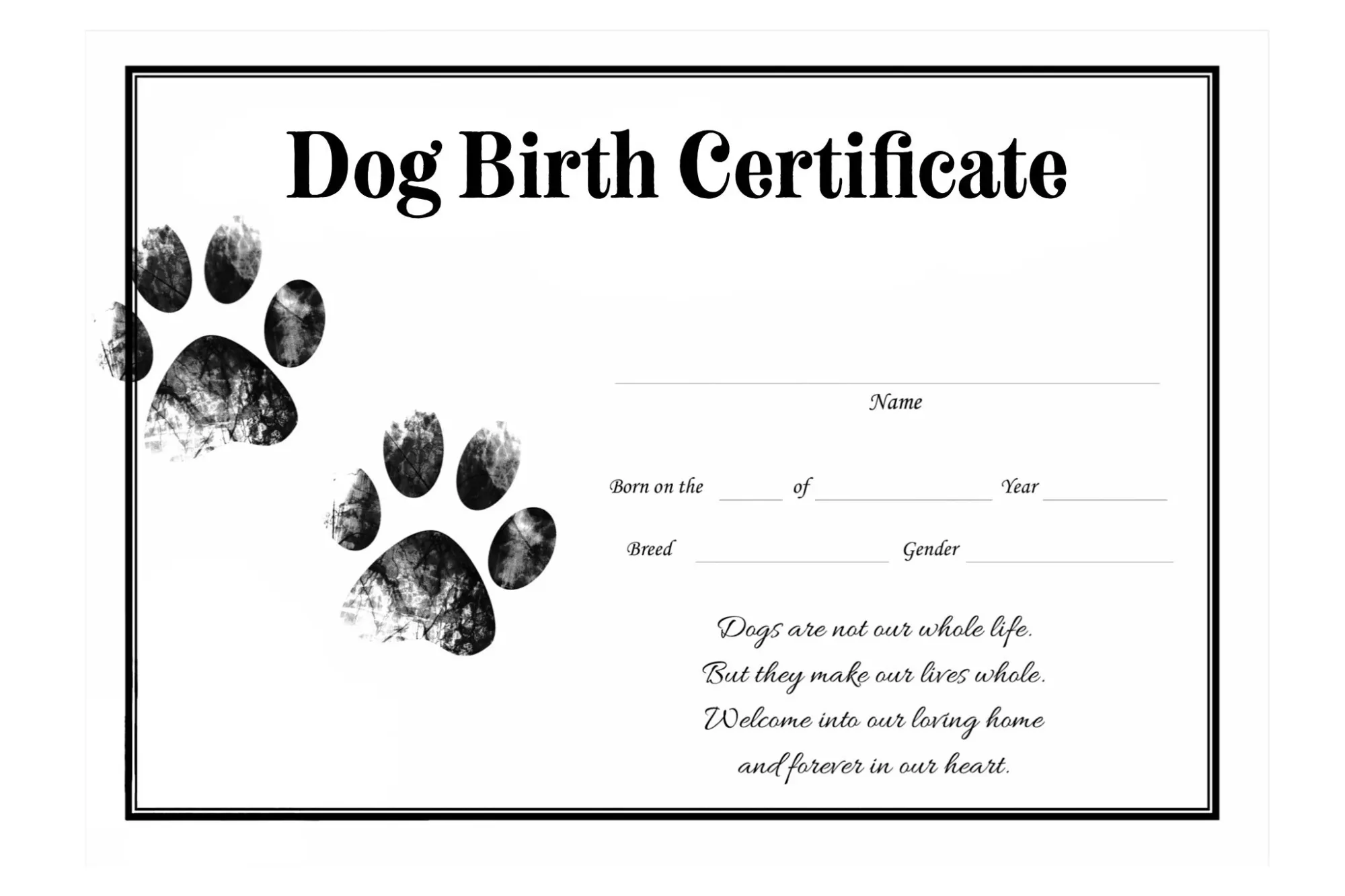Dog papers, often referred to as canine registration or pedigree papers, are official documents that provide essential information about a dog's identity, lineage, and health history. These documents play a crucial role in verifying a dog's authenticity, legal ownership, and eligibility for various activities, such as breeding, showing, and international travel.

Types of Dog Papers
In the realm of canine documentation, various types of papers hold distinct significance, each serving a specific purpose within the domain of dog ownership, breeding, and registration. These documents, often referred to collectively as "dog papers," are pivotal in the verification of a dog's pedigree, lineage, and health history. The ensuing discourse comprehensively delineates these papers, shedding light on their respective attributes and functions.
Registration Papers
Registration papers, as the foundational documents in the world of dog papers, are instrumental in the formal recognition of a dog's breed and pertinent information. Typically issued by kennel clubs and breed registries, these papers corroborate the breed, date of birth, and parentage of a given dog. As such, they are crucial in substantiating the dog's pedigree and breed authenticity, bestowing upon the owner a testament to their dog's breed identity.

Pedigree Papers
A step beyond mere registration, pedigree papers unveil the intricate tapestry of a dog's lineage. These documents traverse multiple generations of ancestors, offering a panoramic view of the dog's genetic heritage. This comprehensive lineage documentation aids breeders in making informed decisions regarding breeding pairings, ensuring the preservation of breed standards, and the propagation of desirable traits.
Health Certificates
In the pursuit of holistic dog documentation, health certificates occupy a pivotal role. These papers bear testimony to the health status of a canine companion, encompassing vital details such as vaccination records, medical treatments, and existing health conditions. Health certificates are indispensable for safeguarding the well-being of the dog, assuring potential buyers, and facilitating international travel where stringent health requirements are imposed.
How to Obtain Dog Papers
The acquisition of dog papers is a meticulous process, often entailing adherence to specific protocols and requirements. Attaining these documents is contingent on the type of paper sought, be it registration, pedigree, or health certificate. Below, we delineate the methodologies involved in obtaining these quintessential dog papers.
Registration Process
The procurement of registration papers necessitates adherence to a structured process, typically outlined by the issuing authority, which is commonly a recognized kennel club or breed registry. The procedure entails the following key steps:
- Selection of a Reputable Kennel Club: Dog owners must commence by selecting a kennel club or breed registry that is recognized and sanctioned within their geographical region or the pertinent breed's domain.
- Submission of Documentation: Owners are required to furnish comprehensive documentation about their dog, including precise information regarding the dog's lineage and health records. The completeness and accuracy of these records are paramount.
- Payment of Fees: The issuance of registration papers is not devoid of fiscal considerations. Applicants must be prepared to cover the requisite registration fees, as delineated by the issuing authority.
- Approval and Document Issuance: Subsequent to the submission of the requisite documentation and the fulfillment of financial obligations, applicants must await the review and approval of their application. Upon meeting the stipulated criteria, the registration papers are duly issued, formalizing the dog's breed identity.
Pedigree Documentation
The acquisition of pedigree papers necessitates a deeper exploration into the ancestral lineage of the dog. This process can be succinctly summarized as follows:
- Researching Ancestry: Owners must embark on a comprehensive quest to unearth information regarding their dog's ancestors. This quest includes tracing lineage back through multiple generations and identifying noteworthy progenitors.
- Contacting the Breed Registry: Once ancestral information is collated, the owner must initiate contact with the relevant breed registry. Here, the owner requests pedigree papers.
- Submission of Proof: The authenticity of the dog's lineage must be substantiated through certified documentation and proof. This may include, but is not limited to, certificates of lineage, historical records, and genetic testing.
- Payment of Fees: As with the registration process, the acquisition of pedigree papers incurs financial obligations, encompassing fees for the issuance and authentication of the pedigree documentation.
Health Records and Certificates
For health certificates, the process primarily revolves around the diligent monitoring of the dog's health status and the facilitation of accurate record-keeping:
- How Often Vet: Owners are enjoined to ensure that their canine companions receive periodic veterinary care. This entails routine health check-ups, vaccinations, and necessary medical treatments.
- Maintenance of Vaccination Records: A fundamental facet of health certificates is the meticulous maintenance of vaccination records. These records serve as a testament to the dog's immunization status, thereby contributing to public health and ensuring the dog's well-being.
- Requesting Health Certificates: Health certificates are typically issued by qualified veterinarians, particularly in circumstances where a dog's health status needs to be documented. This may be requisite for international travel, participation in dog shows, or breeding purposes.
Why Dog Papers Matter
Dog papers hold significant importance for several reasons:
Legal Ownership
Dog papers establish legal ownership, helping prevent disputes over ownership rights.
Breeding and Show Purposes
For breeders, pedigree and registration papers are essential for ensuring the purity of a breed and participating in dog shows.
Health and Genetic Information
Health certificates provide valuable information about a dog's health history, enabling owners to make informed decisions regarding their pet's well-being.
The Significance of Pedigree Papers
Pedigree papers, as an integral component of the canine documentation milieu, hold profound significance in the domain of responsible dog ownership, breeding, and the preservation of breed integrity. These papers, laden with ancestral narratives and genetic legacies, bestow upon dog owners a wealth of information that transcends mere lineage documentation. The ensuing discourse expounds upon the multifaceted significance of pedigree papers in the realm of canine stewardship.

Understanding Pedigrees
At its core, a pedigree represents a meticulously curated family tree for a dog, chronicling its lineage through successive generations. This intricate genealogical tapestry serves as an invaluable resource for breeders and enthusiasts alike. It offers insights into the genetic heritage of a dog, affording a window into the traits, tendencies, and idiosyncrasies that course through its bloodline. This comprehension empowers breeders to make judicious decisions in pairing dogs for breeding, aiming to perpetuate desirable qualities and eliminate hereditary health issues.
Ensuring Purebred Status
For breeds that adhere to strict breed standards, pedigree papers are the litmus test for purebred authenticity. The documented lineage, replete with certified parentage and ancestral records, attests to the dog's unbroken heritage within a specific breed. This confirmation of purebred status is not merely a matter of pride for breeders and owners; it is the bedrock upon which breed integrity is established and maintained.
Heritage and Lineage
Beyond the pragmatic considerations of breeding, pedigree papers bestow upon dog owners a profound sense of connection to their canine companion's heritage. They reveal the story of a dog's lineage, tracing its footsteps through time and geography. This connection to the past fosters a deeper appreciation for the breed's history and the pivotal role it has played in the lives of humans. Pedigree papers, in this context, serve as the narrative thread that weaves the dog into the fabric of a broader historical tapestry.
Ensuring Authenticity
The veracity of pedigree papers is a matter of paramount importance, for they underpin the authenticity of a dog's lineage and, by extension, its breed status. In a landscape where fraudulent documentation can undermine the integrity of breed registries and breeding programs, ensuring the authenticity of pedigree papers assumes critical significance.
Identifying Genuine Dog Papers
Distinguishing authentic pedigree papers from counterfeit or spurious documents necessitates a discerning eye. Genuine pedigree papers typically bear the imprimatur of recognized kennel clubs or breed registries. These documents often feature official seals, watermarks, and other security features that are challenging to replicate. Dog owners and breeders are encouraged to familiarize themselves with the distinctive markers of authenticity associated with the issuing authority to minimize the risk of unwittingly engaging with fraudulent documentation.
Avoiding Fraudulent Documents
The prevalence of fraudulent pedigree papers in the dog breeding world underscores the importance of vigilance. Prospective dog owners and breeders should exercise caution when encountering offers that seem too good to be true or documents that lack the hallmarks of credibility. Due diligence in verifying the authenticity of both the dog and its papers is an essential safeguard against potential scams or misrepresentations.
Verifying Information
In an era characterized by digital interconnectedness, the verification of pedigree information can be expedited through online resources and databases maintained by kennel clubs and breed registries. These repositories serve as repositories of legitimate pedigree information, enabling concerned parties to cross-reference the details presented in pedigree papers. Cross-referencing the information contained within pedigree papers with these authoritative databases is a prudent practice that reinforces the authenticity of the documented lineage.
The Role of Health Certificates
Health History
Health certificates provide a comprehensive history of a dog's medical condition and treatments.
Vaccination Records
They include vaccination records, helping prevent the spread of diseases, and ensuring the dog's well-being.
Importance for Breeders
Breeders rely on health certificates to make informed decisions about breeding and ensuring the health of their breeding dogs.
Dog Papers in Different Countries
The realm of dog papers, encompassing registration, pedigree documentation, and health certificates, exhibits notable variations in form and function across diverse geographical regions. These disparities are chiefly attributed to the differing regulations, standards, and practices upheld by individual countries. The ensuing discussion elucidates the variances in dog papers, underscoring the importance of comprehending these distinctions when navigating the intricate landscape of canine documentation on a global scale.
Variations in Regulations
One salient facet of the diversity in dog papers lies in the regulatory frameworks established by individual countries. These regulations are often formulated by national kennel clubs or breed registries, and they delineate the specific criteria, procedures, and prerequisites governing the issuance of dog papers. Consequently, the breed standards, documentation requirements, and eligibility criteria for registration, pedigree, and health certificates may vary significantly from one country to another.
For instance, a breed recognized and documented as purebred in one country may encounter distinct classification criteria or procedural prerequisites when introduced to a different geographical context. Such variations necessitate meticulous research and adherence to the regulatory guidelines stipulated by the authorities in the respective country.
International Standards
In contrast to the idiosyncratic regulations observed at the national level, there exists a parallel framework of international standards about dog papers, particularly in the context of international travel and competition. These standards are often promulgated by international kennel clubs and organizations, such as the Fédération Cynologique Internationale (FCI).
International standards for dog papers serve the essential purpose of harmonizing documentation requirements across borders, facilitating the seamless movement of dogs across nations, and ensuring that the essential criteria for breed identification, health verification, and pedigree documentation are upheld consistently. Dog owners who aspire to engage in international activities with their canine companions must be acutely aware of these standards, as non-compliance can result in impediments to travel and participation.

It is incumbent upon individuals involved in the international dog community to meticulously align their dog's papers with these internationally recognized standards to obviate potential challenges and discrepancies upon entering foreign territories.
Challenges in Obtaining Dog Papers
The process of obtaining dog papers, notwithstanding the variations between countries, is characterized by inherent challenges that transcend geographical boundaries. These challenges, often encountered by happy dog owners and breeders alike, merit comprehensive consideration.
Lost or Missing Documents
One perennial challenge pertains to the preservation and safeguarding of dog papers. Over time, documents may become lost, damaged, or inadvertently misplaced, leading to a scenario where dog owners must navigate the process of replacing or reissuing these crucial documents. This often entails the reconstruction of ancestral lineage and health records, a process that can be time-consuming and necessitate additional costs.
Breed-Specific Requirements
Certain dog breeds are subject to breed-specific requirements and regulations that may not apply to others. These requirements can encompass stringent health screening, genetic testing, and adherence to specific breed standards. Navigating these breed-specific prerequisites can pose challenges for breeders, particularly those who work with breeds subject to exacting standards.
Cost and Time Involved
The pursuit of dog papers inevitably entails financial considerations, ranging from registration fees to the costs associated with veterinary examinations, genetic testing, and documentation authentication. Additionally, the process of obtaining dog papers can be protracted, involving waiting periods and administrative procedures that necessitate both patience and diligence.
Conclusion
In conclusion, dog papers are essential documents for dog owners, breeders, and enthusiasts. They provide a wealth of information about a dog's identity, lineage, and health history. Understanding the various types of dog papers and how to obtain them is crucial for responsible dog ownership. These documents not only establish legal ownership but also play a significant role in maintaining breed standards, ensuring the health of dogs, and preserving their heritage.

Frequently Asked Questions (FAQs)
- Q1: Are dog papers necessary for all dogs, or only for purebred dogs?
- Dog papers are typically more relevant for purebred dogs, especially when it comes to breeding and showing. However, they can also be beneficial for all dogs, as they provide valuable health information.
- Q2: Can I obtain dog papers for a mixed-breed dog?
- While it may be possible to obtain registration or pedigree papers for mixed-breed dogs in some cases, the process is generally geared towards purebred dogs.
- Q3: What should I do if I lose my dog's papers?
- If you lose your dog's papers, contact the issuing organization or kennel club to inquire about reissuing them. Be prepared to provide any necessary documentation.
- Q4: How can I verify the authenticity of dog papers when buying a dog?
- When buying a dog, ask for the seller's documentation and verify it with the issuing organization. Look for official seals, watermarks, and other security features.
- Q5: Are there international standards for dog papers when traveling with my pet?
- Yes, there are international standards for pet travel documents. Ensure your dog's papers meet the requirements of the destination country and international regulations.






